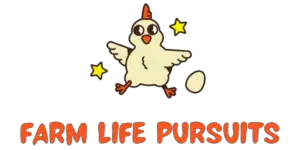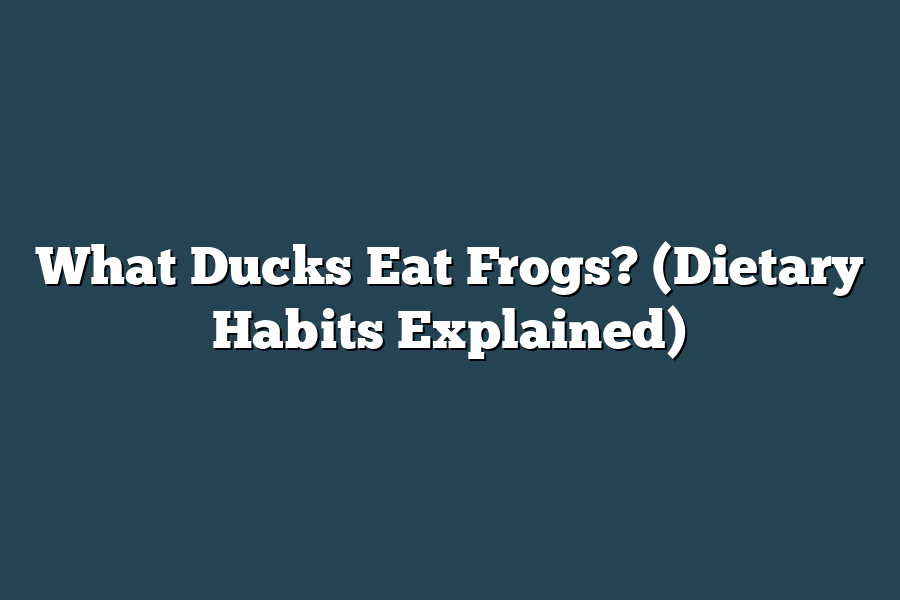Ducks do not typically eat frogs as a primary part of their diet. Ducks are omnivores and generally consume a diet consisting of aquatic plants, insects, small fish, and algae. While they may occasionally consume small amphibians like frogs, it is not a common or significant part of their regular food intake.
Curious about what ducks eat?
From seeds to invertebrates, their menu is diverse.
But do ducks actually eat frogs?
Let’s explore their dietary habits, debunk myths, and learn why seeds and plants are essential for their well-being.
Join me on a journey through the world of duck dining!
Table of Contents
What Do Ducks Eat as Omnivores?
Have you ever wondered what ducks munch on as they paddle gracefully across ponds and lakes?
Ducks are fascinating creatures known for their diverse diet as omnivores.
Let’s delve into the world of duck dining habits to discover what these feathered friends like to feast on.
Plant-Based Diet
Ducks are not just quackers, they are also avid consumers of plant matter.
Some of the favorite plant-based foods in a duck’s diet include:
- Seeds: Ducks love to nibble on seeds such as corn, rice, and wheat, which provide essential nutrients and energy for their daily activities.
- Aquatic Plants: These waterfowl enjoy chowing down on aquatic plants like duckweed, water lilies, and algae. These plants offer a good source of fiber and moisture in their diet.
- Grass and Weeds: Ducks are known to graze on grass and weeds found around bodies of water, adding variety to their plant-based menu.
Protein-Rich Fare
In addition to plants, ducks also incorporate protein-rich foods into their diet to meet their nutritional needs.
Some protein sources for ducks include:
- Insects: Ducks are opportunistic feeders and will eagerly consume insects like beetles, caterpillars, and mosquitoes. Insects not only provide protein but also essential vitamins and minerals for ducks.
- Fish: While ducks are not known to actively hunt fish, they may occasionally feast on small fish or fish eggs, especially during breeding seasons.
Aquatic Delicacies
Ducks spend a significant amount of time in the water, foraging for aquatic delights that make up a crucial part of their diet:
- Frogs: Yes, ducks do eat frogs! While frogs may not be a staple in a duck’s diet, they are opportunistic feeders and will snatch up a frog if the opportunity arises.
ducks have a varied diet that includes plant-based foods, protein-rich fare, and aquatic delicacies.
From seeds and aquatic plants to insects and the occasional frog, ducks are resourceful omnivores that adapt their diet to their environment.
Next time you see a duck quacking by the water’s edge, you’ll have a better understanding of what these charming birds like to eat.
Stay tuned for more fascinating insights into the world of wildlife dining habits!
Exploring the Natural Diet of Ducks: Seeds, Plants, and Invertebrates
As we delve into the intriguing world of what ducks consume, we find that their diet consists of a diverse range of foods, including seeds, plants, and invertebrates.
Let’s break down each component to understand the natural feeding habits of these fascinating waterfowl.
Seeds: A Staple Source of Nutrition
Ducks are known to relish seeds from various aquatic plants such as bulrush and wild rice.
These seeds provide essential nutrients, including carbohydrates and proteins, necessary for the ducks’ energy and growth.
According to a study published in the Journal of Wildlife Management, ducks primarily rely on seeds during their breeding season to support their reproductive efforts.
Plants: Vital for Digestion and Health
In addition to seeds, ducks also graze on a variety of plants like algae, milfoil, and duckweed.
These plant materials are crucial for aiding digestion and maintaining overall health.
Plants offer fiber that helps in proper digestion and nutrient absorption.
An interesting case study from the University of California found that ducks exhibited improved gut health when their diet included a diverse array of aquatic plants.
Invertebrates: Adding Protein to the Menu
To round out their diet, ducks actively hunt for invertebrates like insects, snails, and small crustaceans.
These invertebrates serve as a rich source of protein, essential for muscle development and overall vitality.
Research conducted by the National Audubon Society highlights the importance of invertebrates in a duck’s diet, especially during the molting season when protein requirements are heightened.
By incorporating a mix of seeds, plants, and invertebrates into their diet, ducks maintain a balanced nutritional intake that supports their growth, reproduction, and overall well-being.
Next time you spot a duck gracefully gliding on a pond, take a moment to appreciate the intricate culinary choices that sustain these magnificent waterfowl in their natural habitat.
As we continue our exploration of the dietary habits of ducks, we will uncover more fascinating insights into their feeding preferences and behaviors.
Stay tuned for the next section where we delve into the seasonal variations in a duck’s diet and how they adapt to changing food sources.
Do Ducks Eat Frogs? Debunking the Myth
Have you ever wondered if ducks eat frogs?
It’s a common question that sparks curiosity among nature enthusiasts and animal lovers alike.
In this section, we will delve into this fascinating topic to uncover the truth behind this age-old myth.
The Reality Behind Duck Diets
When it comes to their diet, ducks are known to be omnivores, meaning they consume a wide variety of food sources.
While they primarily feed on aquatic plants, seeds, insects, and small fish, the idea of ducks preying on frogs is not entirely unfounded.
In fact, certain species of ducks have been observed to occasionally indulge in frog consumption as part of their diet.
The Case of Mallards and Frogs
One of the most commonly recognized duck species, the Mallard, has been documented engaging in frog predation.
Studies conducted by the National Audubon Society have revealed that Mallards, particularly during the breeding season, may include frogs in their diet.
These observations highlight the diverse feeding habits of ducks and their ability to adapt their diet based on seasonal availability.
Frog Consumption: A Natural Behavior
While the idea of ducks eating frogs may seem surprising to some, it is essential to understand this behavior within the context of the natural food chain.
Frogs can be a nutritious source of protein for ducks, especially when other food sources are limited.
This adaptive behavior showcases the resourcefulness of ducks in the wild and their ability to thrive in various environments.
while ducks primarily feed on a combination of plants, seeds, and small creatures, including insects and fish, instances of duck predation on frogs do occur.
It is important to recognize the diverse dietary habits of ducks and their role in maintaining ecological balance within their habitats.
So, the next time you spot a duck near a pond or wetland, remember that these fascinating creatures may have a more varied diet than meets the eye.
Stay tuned for more insightful revelations about the world of ducks and their fascinating behaviors.
In the next section, we will explore the relationship between ducks and aquatic plants, shedding light on the intricate balance of nature’s ecosystem.
The Importance of Seed and Plant-Based Diets for Ducks
When it comes to the dietary habits of ducks, seed and plant-based diets play a crucial role in their overall health and well-being.
Let’s delve into why these diets are essential for ducks and how they impact their daily lives.
Why Ducks Thrive on Seed and Plant-Based Diets
Ducks are known to be omnivores, meaning they consume a wide variety of foods.
However, seeds and plants form a significant portion of their diet for several reasons:
Nutritional Value: Seeds are packed with essential nutrients such as protein, fats, and carbohydrates, crucial for the growth and development of ducks.
Energy Source: Plants and seeds provide ducks with the necessary energy to sustain their active lifestyles, especially during migration seasons.
Digestive Health: The fibrous content of plant-based foods aids in digestion and promotes gut health in ducks.
Natural Diet: Seeds and plants mimic the natural diet of wild ducks, ensuring they receive the nutrients they require to thrive.
Benefits of Seed and Plant-Based Diets for Duck Populations
Research has shown that duck populations benefit significantly from consuming seed and plant-based diets.
According to a study by the National Wildlife Federation, ducks that have access to a diverse range of seeds and plants exhibit higher reproductive success rates.
Case studies from duck habitats worldwide demonstrate that a diet rich in seeds and plants leads to healthier populations with lower instances of disease and malnutrition.
In regions where ducks have ample access to seed and plant-based foods, conservation efforts have resulted in an increase in duck populations, highlighting the importance of these dietary choices.
Supporting Duck Conservation Through Seed and Plant-Based Diets
By understanding the importance of seed and plant-based diets for ducks, conservationists and wildlife enthusiasts can play a vital role in preserving duck populations.
Planting native vegetation, creating wetland habitats, and implementing seed conservation programs are all strategies that can support ducks in their natural environments.
seed and plant-based diets are not only essential for the health and well-being of ducks but also play a critical role in preserving duck populations for future generations to enjoy.
By promoting these diets and supporting conservation efforts, we can ensure that ducks continue to thrive in their natural habitats.
Final Thoughts
Ducks have a diverse dietary range that includes seeds, plants, and small invertebrates, but frogs are not a typical part of their menu.
Understanding the natural diet of ducks is essential for their health and well-being.
By debunking the myth that ducks eat frogs, we can appreciate the importance of providing seed and plant-based foods for these feathered friends.
Next time you’re near a pond or lake, take a moment to observe the wildlife around you, including the ducks, and remember to respect their dietary habits.
Whether you’re a bird enthusiast or simply enjoy nature, sharing this newfound knowledge can help protect and preserve the habitats of these beautiful creatures.

